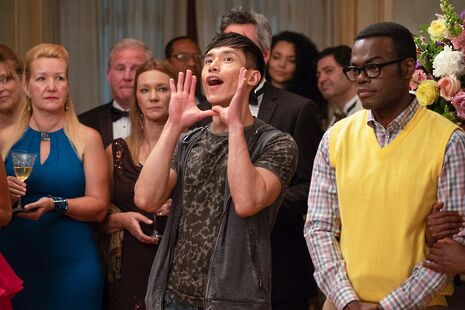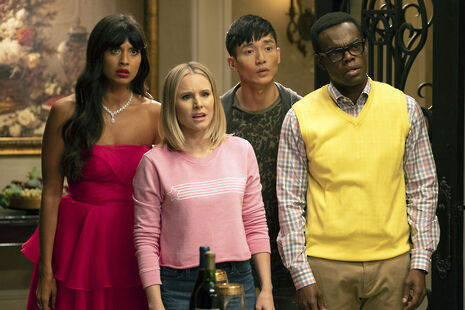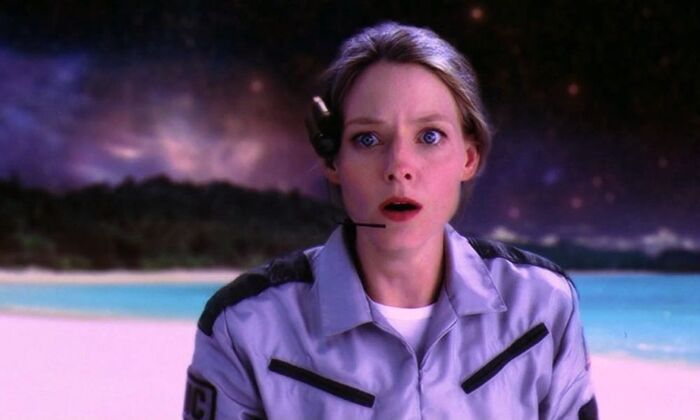Searching for answers in The Good Place
Following the release of its fourth season, Toby Saer asks The Good Place the difficult questions

At first glance, The Good Place appears to be a retort to John Lennon’s secular anthem ‘Imagine’: it seems to reclaim the transcendent, reflecting a world where predictions of wholesale religious decline have proved wrong.
Imagine there’s a heaven / It’s easy if you try / Bad Place below us / A Good Place in the sky
This is what Eleanor Shellstrop (Kristen Bell) discovers when she wakes up in the titular Good Place, having died on Earth. The only problem? The system has got it wrong and has confused her (a self-confessed “Arizona trashbag”) with someone who truly belongs there. Thus commences an exploration of morality, ethics, and humanity.
In constructing its universe, The Good Place draws extensively from common perceptions of religion. One of the show’s big assumptions is that everybody has a conscience: a knowledge of right and wrong which should guide one’s actions. The visual language of the show, with pastel colours and bright light for the Good Place, and darkness and screaming for the Bad Place, confirms its reliance on popular conceptions of paradise.
Beneath this thin veneer of transcendence, however, lies a fundamentally secular humanism. The show here balances two sides: it glorifies objectivity, reason and the scientific method, while celebrating flawed humanity. It believes that perfection is non-existent, let alone attainable, yet still celebrates its pursuit. For example, the show rejects the omnipotent, omniscient, and omnibenevolent Judeo-Christian God. Instead, it is stripped of everything except its role as a cosmic dispenser of blind justice and the arbiter (‘The Judge’, a glorious Maya Rudolph) is a binge-watching, burrito-eating, perpetually horny humanoid.

The series argues that becoming a better person involves, on one hand, carefully studying moral philosophy. But it also requires self-examination and looking for a conscience that every human, however flawed, possesses.
It is unsurprising that the show’s odyssey of philosophy leads it to some familiar religious questions. But when it stops asking questions, and begins attempting answers, the show finally begins to falter. Having avoided the thorny issue of the cut-off for entry to the Good Place for nearly three seasons, the show neatly side-steps it altogether by coming to the surprisingly Christian conclusion that, in fact, no-one is good enough to earn a spot in paradise.
However, the show fails to face up to the consequences of the proposition that either heaven is rightfully empty, or something beyond human efforts must come into play. Instead, the show retreats to a position it had previously admirably avoided and blames the humans’ circumstances. The globalised world is too hard to navigate without some unintentional wrongdoing, so humanity is off the hook. Fortunately, the show realises how unsatisfying this is, and wisely drops that thread.
“But if, as the show suggests, to be human is to find no meaning in the mess, I find it hard to be joyful.”
The most ambitious moment in the show, but also the most dissatisfying, comes when it tries to answer explicitly the question of the ultimate meaning of the universe. “If there were an answer to how the universe works, it wouldn’t be special,” it claims. It demands not the rejection of meaninglessness, but its embrace, and a commitment to love even when, ultimately, it means nothing.
For the characters, as for many viewers, the question is asked from a place of pain and loss. Given the extraordinary journey of infinite stakes we have shared with them, the sentiment rings hollow and unpleasant. It asks the viewer and the characters not only to accept the suffering that they have experienced, but to celebrate it. The show isn’t a retort to ‘Imagine’ after all – it is a fulfilment of its call to joy in a meaningless universe.
Looking back at showrunner Mike Schur’s previous work, it is no surprise that The Good Place represents such secular humanism: Brooklyn Nine-Nine and Parks and Recreation are odes to humanity’s ability to do better. Both contend that we cannot look to power or celebrity for heroism – you have to be your own hero, and encourage those you love to do the same.
But if, as the show suggests, to be human is to find no meaning in the mess, I find it hard to be joyful. The Good Place is a deeply optimistic show, and a consistently funny one. It is often profound, but is, for me at least, unsatisfying in the answers it preaches.
A student’s time at Cambridge is a chance not just to discover what brings joy, but what ultimately satisfies. I hope that The Good Place, a charming, thoughtful show on Netflix, is a starting point, but not the destination.
 News / Caius mourns its tree-mendous loss23 December 2025
News / Caius mourns its tree-mendous loss23 December 2025 News / Cambridge welcomes UK rejoining the Erasmus scheme20 December 2025
News / Cambridge welcomes UK rejoining the Erasmus scheme20 December 2025 News / CUP announces funding scheme for under-represented academics19 December 2025
News / CUP announces funding scheme for under-represented academics19 December 2025 News / King appoints Peterhouse chaplain to Westminster Abbey22 December 2025
News / King appoints Peterhouse chaplain to Westminster Abbey22 December 2025 Interviews / Politics, your own way: Tilly Middlehurst on speaking out21 December 2025
Interviews / Politics, your own way: Tilly Middlehurst on speaking out21 December 2025









